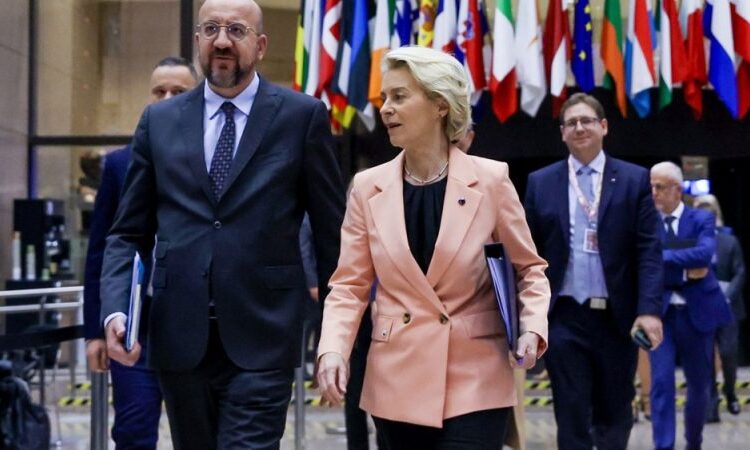
However, using the money to buy weapons is problematic for some, including neutral militarily non-aligned countries such as Austria, Ireland, and Malta.
“For us neutrals, it must be ensured that money, for which we give our approval, is not spent on weapons and ammunition,” Austria’s Chancellor Karl Nehammer said.
Michel said the bloc could find ways to take into account their concerns.
“Russia must feel the real cost of war and the need for a just peace,” Ukraine’s President Volodymyr Zelenskyy said, urging EU leaders to go even further and use the assets themselves, a step that the bloc is not considering so far.
‘Power grab’ fears
Even without a coherent plan on financing the new shift, the Commission in a short time has laid out plans for a European strategy on defence.
This includes von der Leyen’s idea of a new defence (industry) commissioner for the next term, more dedicated defence funding, expanding the bloc’s defence industrial base and using Russia’s frozen assets.
They even go as far as the EU’s executive being ready to place arms orders for member states in a boost to joint arms procurement.
But von der Leyen’s plan for a European defence industrial strategy is getting pushback from several EU countries, including Germany, which supports boosting the sector but fears the plan includes a power grab of national competencies.
In Thursday’s summit discussions, EU diplomats said there was considerate scepticism.
Germany’s Chancellor Scholz told EU leaders the bloc would not need “another state-like structure for defence in the EU” or create new competencies that would amount to a power grab, according to two people with knowledge of the talks.
While he stressed the need to develop the bloc’s potential regarding joint procurement, he rejected the idea of having the Commission as an intermediary, which could slow processes down, they said.
“She wants to be a war-time president but forgets that the EU is not a state,” one EU diplomat said, echoing those who criticise her for using defence to help her get a second term in office.
Contentious EDIP
Over the past months, several EU countries have expressed concerns over the Commission’s intentions behind the European Defence Investment Programme (EDIP), the EU executive’s ambitious framework to boost the bloc’s military-industrial complex.
Several innovative measures are considered sensitive, as they would give EU member states and the Commission the power to reorientate industries’ priorities, fund weapons production, and give the EU body an overview of manufacturing capacities and supply chains usually protected by governments for national security reasons.
When presenting the text, Internal Market Commissioner Thierry Breton said that his house would not be interested in a “power grab” and denied any loose interpretation of the EU treaties, which forbid channelling EU funds to military operations.
To avoid the accusation, the European Commission based its proposal for an industrial policy – like with previous defence industry schemes – on Article 173 of the EU treaty, giving ways to work on the bloc’s industry competitiveness.
The Commission’s directorate general in charge of implementing the programme—DG DEFIS—has recently sent envoys to prepare the groundwork with EU countries to diffuse any potential issues.
Despite the concerns, EU leaders on Thursday tasked national ministers with looking into the EDIP text “without any delay”.
Negotiations on the technical details are set to start in early April, with the Council to set its position in June before the new European Parliament comes into session over the summer.
[Edited by Alice Taylor]







